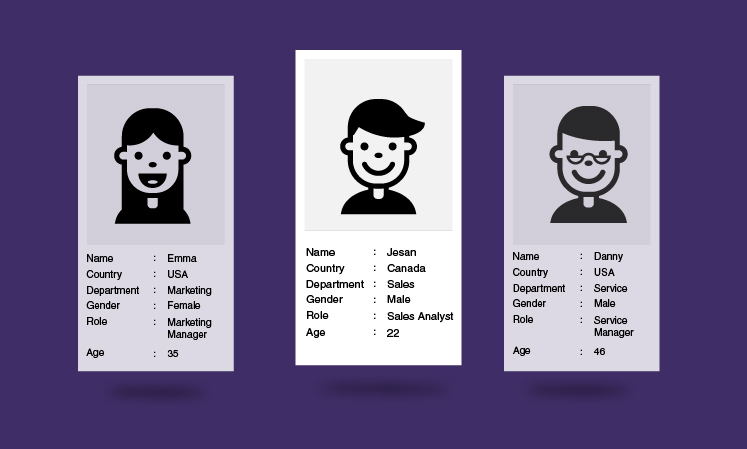How to create a detailed buyer persona
Buyer personas are key to growing your business. They help you understand who your ideal buyers are, what they need, and how to best sell to them. A detailed buyer persona helps you zero in on the pain points, challenges, and needs of your customers. It also helps you understand how to appeal to prospects and generate interest in your product.
You can find buyer persona examples and an easy to use buyer persona template online. But to use them effectively, you must understand what they are and how to leverage them to increase sales and grow your business. Let’s dig in and start with the basics.
What is a buyer persona?

A buyer persona is a detailed profile of a hypothetical key decision maker who is involved in deciding whether or not to purchase your product or service. It helps you define who your potential buyers are and what makes them tick. An effective buyer persona includes information such as:
- Position in their company
- Which department they represent
- Their pain points and biggest challenges
- Their goals for the future
- Age, gender, and personality type
- How you should speak to them
- And ultimately, how your product can solve for their challenges
What is the purpose of a buyer persona?
When you create a detailed portrait of your ideal, most common type of buyer, you can market to prospects in a more relevant and personal way. You can speak directly to their pain points and challenges and illustrate how your product will help solve for those challenges.
The key is to use buyer personas in your marketing efforts to:
- Illustrate to prospects that they have a problem they were not aware of
- Reach out to them in a way that resonates with and engages them
- Spark their interest in your product or service
- Provide information on how your product or service will solve for that problem
- Provide real-life examples of how your product or service has helped their peers
- Convince them to buy so they can use your product or service to solve that problem
Why are buyer personas important?
Buyer personas help you deliver the right message to the right person. Too many companies make the mistake of assuming they know who their customers are and using those assumptions to drive their outreach.
Taking this approach leaves you open to sending irrelevant messages to the wrong people. For example, if you’re reaching out to a sales manager but are talking about how a marketing automation solution will help them, you’re sending an irrelevant message that they will most likely ignore.
Alternatively, executives don’t want to hear about features; they want to hear about how their business will grow and realize success by using a product. If you send them feature filled information rather than benefits filled information, you will likely lose them instantly.
Detailed buyer personas will ensure that you deliver the right information to the right decision makers, which will help increase engagement and interest in your product. This will lead to more deals closed and revenue growth.
Creating buyer personas

To create a great buyer persona, you need to do considerable research. As mentioned above, if you go on assumptions you will end up with buyer personas that are inaccurate and don’t capture the right details about each person involved in the decision-making process.
Send surveys to your current customer base to gain insight into what they need, where their challenges lie, and how you can solve for those problems to make your customers more successful.
Then, apply that learning to your buyer personas and use it to speak to your prospects in a more relevant and engaging way.
It’s also helpful to provide customers with an incentive for completing the survey so you can receive more data. The more data you have, the more accurate your buyer personas will be.
This incentive could be a $5 gift card for the first 100 customers to complete the survey. Many more will complete it, but this tactic will spur them to action. The data you gather will be worth far more than $500.
But what questions should you ask in your buyer persona survey? These questions will vary depending on your unique business and its distinct customer base. But here are a few to get you started:
- What is your age, gender, marital status, and other demographic info?
- What is your highest level of education?
- What is your job title and role in the company?
- How long have you been with the company?
- Where is your company located?
- What are the biggest challenges you face in your day-to-day job?
- Name one thing you want to change that could make you more efficient at your job?
- How many employees are at your company?
- Which technology and tools do you use every day?
- What are your goals for the next year?
- What is the biggest obstacle standing in the way of achieving that goal?
That is just a sample of the types of questions that you could ask in your survey. Be as creative as you want but try to keep your survey to 20 questions or less. Otherwise, your response rate will decline.
Make it as easy on your customers as possible. And don’t ask for their name or any other personal information in the survey as that data is irrelevant to the task at hand.
Once you have all that information, you can start to look for commonalities in the responses. Then you can build your buyer personas based on the common traits and responses you receive.
Pro tip: When you send your survey to capture information to inform your buyer personas, don’t flat out tell your audience that this is your motive. Rather, tell them that you would like to understand better who they are so that you can serve them more effectively, per their needs.
Conclusion
Buyer personas help differentiate average companies from exceptional ones. Without the information compiled in your buyer personas, you are shooting in the dark.
Not only do buyer personas help sales understand who they are selling to, they help your marketing team personalize their marketing outreach.
Don’t hesitate to create an array of buyer personas. Some companies have ten or more, and that’s ok. It all depends on the diversity of your business, the number of products you sell, and the diversity of your customer base.
With solid and accurate buyer personas in place, you will be able to reach out to prospects and engage them in a way that is much more relevant to their needs. This will build trust and help you close that deal more easily. That’s why buyer personas are so important to growing a business and maintaining a competitive edge in your respective market.
Those that develop detailed buyer personas will generate more leads, convert more prospects into customers, and grow more rapidly. Those that make assumptions like those mentioned above will fall behind quickly.
Do you have any anecdotes about buyer personas that you’d like to share with our audience? Or any questions about buyer personas that we could help you with? Let us know in the comments section below!

No Comments